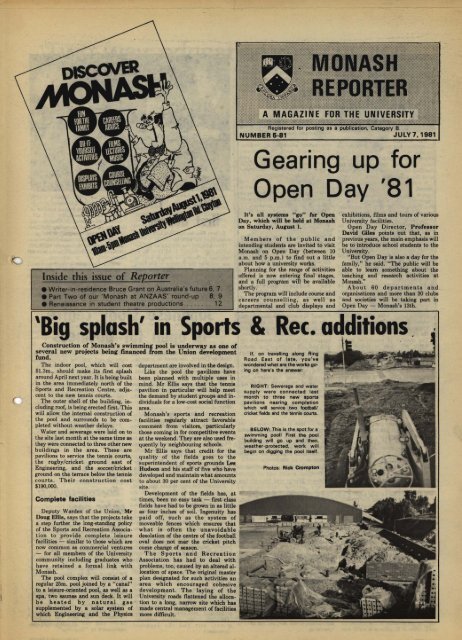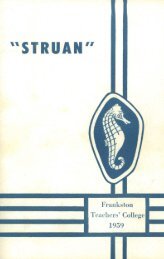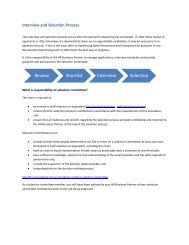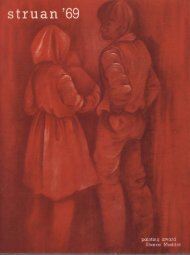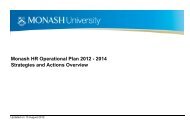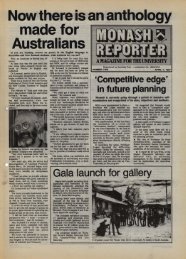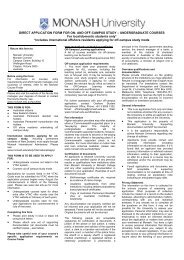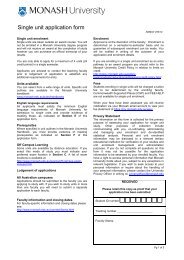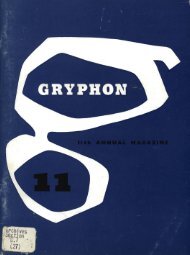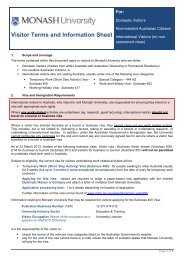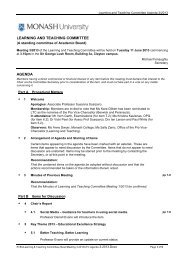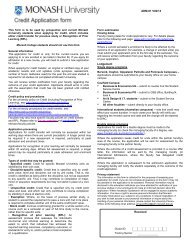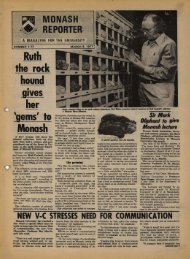No.5-81 July - Adm.monash.edu - Monash University
No.5-81 July - Adm.monash.edu - Monash University
No.5-81 July - Adm.monash.edu - Monash University
- No tags were found...
Create successful ePaper yourself
Turn your PDF publications into a flip-book with our unique Google optimized e-Paper software.
NUMBERas a" .;: ;. ;. .. .:.:: ::: ::,Gearing up for Open Day '<strong>81</strong> It's all system. HIOH lor OpenDay, which will be held at Monaahon Saturday, August I.Members of the public andintending studenta are invited to visit<strong>Monash</strong> on Open Day (between IOa.m. and 5 p.m.) to find out a littleabout how a university works.Planning for the range of activitiesoffered is now entering final stages,Inside this issue of R!p.,orterand a full program will be available <strong>Monash</strong>." • Writer-in-residence Bruce Grant on Australia's future 6, 7.shortly.The program will include course andexhibitions, films and tours of various<strong>University</strong> facilities.Open Day Director, Prote8l0rDavid Giles pointa out that, as inprevious years, the main emphasis willbe to introduce school studenta to the<strong>University</strong>."But Open Day is also a day for thefamily," he said. "The public will beable to learn something about theteaching and research activities atAbout 60 departments andorganisations and more than 30 clubs• Part Two of our '<strong>Monash</strong> at ANZAAS' round-up . . 8, 9 careers counselling, 8S well as and societies will be taking part in• Renaissance in student theatre productions .. . . . . . 12 departmental and club displays and Open Day - <strong>Monash</strong>'s 13th.'Big splash' In • Sports & Rec. additionsConstruction of <strong>Monash</strong>'s swimming pool i8 underway a8 one orseveral new projects being financed Crom the Union development If, on travelling Iiong Ringfund_Road East of I.te, you'veThe indoor pool, which will cost department are involved in the design. wondered what are the works gcr$J.3m., should make ita first splash Like the pool the pavilions have ing on here's the anewer:around April next year. It is being built been planned with multiple uses inin the area immediately north of the mind. Mr Ellis says that the tennis RIGHT: Sewerage and waterSports and Recreation Centre, adja pavilion in particular will help meet supply were connected I••tcent to the new tennis courts. the demand by student groups and in month to three new aport.The outer shell of the building, in· dividuals for a low·cost social function pavilion. nearing completioncluding roof, is being erected first. This area. which will saMes two footbalVwill allow the internal construction of <strong>Monash</strong>'s sports and recreation cricket fiekjs and the tennis coons.the pool and surrounds to be com· facilities regularly attract favorablepleted without weather delays. comment from visitors, particularlyBELOW: This is the spot for aWater and sewerage were laid on to those coming in for competitive eventsswimming pooll First the poolthe site last month at the same time as at the weekend. They are also used fre building will go up and then,they were connected to three other new quently by neighbouring schools. weather·protected, work willbuildings in the area. These are Mr Ellis says that credit for the begin on digging the pool itself.pavilions to service the tennis courts, quality of the fields goes to thethe rugby/cricket ground east of superintendent of sports grounds LeaEngineering, and the soccer/cricket Hudson and his staff of five who have Photos: Rick Cromptonground on the terrace below the tennis developed and maintain what amountacourts. Their construction cost to about 30 per cent of the <strong>University</strong>$190,000. site.Development of the fields has, atComplete facilities times, been no easy task - fl1'8t classfields have had to be grown in as littleDeputy Warden of the Union, Mr as four inches of soil. Ingenuity hasDoug ElIi., says that the projects take paid off, such as the system ofa step further the long·standing policy moveable fences which ensures thatof the Sports and Recreation Associa what is often the unavoidable I~II!!~'"tion to provide complete leisure desolation of the centre of the footballfacilities - similar to those which are oval does not mar the cricket pitchnow common as commercial ventures come change of season.- for aU members of the <strong>University</strong> The Sports and Recreationcommunity including graduates who Association has had to deal withhave retained a formal link with problems, too, caused by an altered al<strong>Monash</strong>.location of space. The original masterThe pool complex will consist of a plan designated for such activities anregular 25m. pool joined by a "canal" area which encouraged cohesiveto a leisure-oriented pool, as well as a development. The laying of thespa, two saunas and sun deck. It will <strong>University</strong> roads flattened the alloca·be heated by natural gas · tion to a long, narrow site which hassupplemented by a solar system of made central management of facilitieswhich Engineering and the Physics more difficult.
I"Not only does it Infringe universityautonomy in a blatant way, it alJobypasses the normal triennial First tbe RazorGaIlX, thell theGuidelilles - flOW: processes and ignores consultation between Commonwealth and Steteson these issues, which is statedGovernment policy."ves joinDEAKINbattleAt Deakin <strong>University</strong>, theAcademic Board has protested "inthe strongest possible terms" on thedecision to phase out professionalThe Australian Vlce-Chancellon'Committee has expreased "extreme engineering <strong>edu</strong>cation in Geelong.ncern" at the Federal The Board said in a recentresolution that tbe decision was~i:~~~~~:guldelin'" Commis.lon to the on Ter- the based on a misinterpretation of the of Australian univenltl... advice of the Victorian Poet SecoDthe nest three years,dary Education Commission.A statement relellllOd recently (aee The chairman of VPSEC hasSound 18·<strong>81</strong>) states: "The AVCC stated: "Tbe Commonwealthregrets the Government's failure to Government's decision aboutengineering in this <strong>University</strong> goesis named, and Sir Llnd...ay Clark,implement the recommendatioIll offar beyond anything proposed bywhose gifIB ' to the <strong>University</strong> includethe Tertiary Education Commiaaion,RBH - TheVPSEC."the superb Leonard French window inrecommendations which were in anythe west wall of the Hall.event austere.In a brief addresa, Dr Hiscock said"The guidelines will result in an FAUSA first decade!that the Hall had more than fulfilledeffective r<strong>edu</strong>ction of finance for Robert Blackwood Hallla.t month its early promise - already it had pas·universities at a time when, according The Federation ot Au.otrallan celebrated its 10th birthday. sed the million'patron mark. A recentto the TEC, a prime consideration Univenlty Stair AslOClationa has The occasion was marked on the an· check had shown that nearly 1,030,000should have been not to allow a decline also expressed "grave concern" at niversary - Friday, June 19 - by an attended functions there in the past 10in the quality of universities and the Government's "unilateral informal gathering of people who, in years.colleges of advanced <strong>edu</strong>cation." decis,on" to phase out engineering the words of the Director of the Hall, • Rick Crompton's picture shows,Among decisions contained at Deakin.Dr Ian Hiacock, "worked with great from left: Professor Ken Hunt, Ladythe whicb the A VCC The statement says: "The dedication" to make the Hall a reality. Chemberlin, (widow of Sir Micheelwere:decision appears inconsistent with The guesIB included Sir Robert Chamberlin, the <strong>University</strong>'s firstTbe cutback in buildings the widely . acknowledged Blackwood, tbe <strong>University</strong>'s founding Deputy Chancellor), Sir Robertexpenditure from $5Om, to $34.8m, forthcoming shortage of professional Chancellor, in whose honour the Hall Blackwood and Sir Lindesay Clark.The abolition of retroepective coot engineers. It is an exampleadjustmenIB bllllOd on indexes of 'shotgun manpower planning'.cost movements and their "It is quite inconsistent with thereplacement with adjustments Federal Government's statements, Japanese study (entre based on the Government's own only 18 monthe ago, to the effectpredictions of changes in cosIB for that it would, in determining thethe year.pattern of tertiary <strong>edu</strong>cation, •The number of earmarked granIB continue to have prime regard to thewhich will serve to r<strong>edu</strong>ce even demand for places from thoseIS open for business further operating funds.qualified and those wishing to enter Melbourne now has a Japanese • To promote co-operation inAbolition of the Education Research particular courses.Studies Centre, designed to provide research and teaching in these fieldsand Development Committee. "The decision is an infringement a focus for the study of Japan and to and to promote academic exchanges• The way in which the decision to on the independence of Deakin promote understanding of that with specialists in Japan andphase out engineering <strong>edu</strong>cation at <strong>University</strong> and threatens the country in Victoria.elsewhere.Deakin <strong>University</strong> was taken. concept of university autonomy The Centre, officially launched on • To encourage the dissemination ofOn this issue the A VCC says: overall. "June 24, is based at <strong>Monash</strong>, and its knowledge of Japan and the Japanesefounding president is Professor Jiri language in society at large and parNeustupny, chairman of the depart· ticularly in <strong>edu</strong>cational institutions.Now you see it, now • • • •? ment of Japanese.• To provide information throughOther members of the board are: publications, seminars and lectures.Mr Les Oates (<strong>University</strong> ofThe Vice·Chancellor, Prote.sor money - that is, additional to the Melbourne - Vice·President); Dr FOOTNOTE: * Tonight * * (<strong>July</strong> 7) theMartin, suggested last month that the operating funds customarily provided Y 08hio Sugimoto (La Trobe Univer .. Centre will undertake iIB first publicFederal Government might have for the triennium.sity - Director); Mrs Alina venture -. a free lecture on "Law inrobbed Peter to pay Paul in "A cynical view would suggest that Skoutarides (Swinburne Institute of Japanese Society", by Dr Malcolmformulating iIB <strong>edu</strong>cational guidelines it is simply ear·marked money taken Technology - Treasurer); Associate Smith, senior lecturer in Law,for 1982 to 1984.from the funds available for the new Professor Harold Bolitho (<strong>Monash</strong>); <strong>Monash</strong>.Opening the first meeting of the new triennium.Ms Helen Marriott (Swinburne); Mr The lecture will be given at 7.30 p.m.<strong>Monash</strong> Neurosciences Group on June "Peter might have been robbed to Roger Pulvers (Melbourne); Ms in Lecture Theatre 2, Latham13, Professor Martin traced the history pay Paul!"Susan Wilson (Montmorency High Building, Melbourne <strong>University</strong>.of special research funding over recent Professor Martin said <strong>Monash</strong> had School).years.already gained international Professor Neustupny said this week He said:recognition as a centre of excellence for that the Centre would be primarily a "On May 15 this year, tbe present its contribution to the neurosciences. planning agency for the development EnergY-Slivers:Government announced the The new group, be aeid, brought of further Japanese studies in Victoria. appointment of a committee of four to together steff from many parts of the It would be able to implement a enler now ••• make recommendations on what it <strong>University</strong> who were interested in the number of tasks and initiatives that claimed was a major new initiative to area of neurosciences - in medicine, existing departments in tertiary incompetitiontor the bHt deai", for a<strong>July</strong> 20 is the cloaing date of aestablish Research Centres of Excel· physiolOlQl, anatomy, biochemistry, stitutions and the schools are unable tolence in Australian universities. psychology, pharmacology and other tackle.notice encouraging people uaing"As you know, an amount of $1 departments such as electrical Professor Neustupny said that atUnivenity building. to save energy.million is to be allocated for spending engineering.present more than 30 schools in Vicbeingconducted by <strong>Monash</strong>'.First prbe in the competition,in 19<strong>81</strong>, and a further $15 million The group planned to conducttoria were teaching Japanese languagebetween 1982 and 1984.regular seminars for graduate studenIB- but the Centre would be keen to en· Energy Conservation Committee, I."While not wishing to be critical of and steff throughout the year, and ifcourage more teaching ahout Japan.$100.this initiative, it is distressing to have there was' good support for theseAmong the aims and objectives ofThe winning design will he usedto draw your attention to the fact that activities tben it was intended that thethe Centre are:for a sUcker to be placed alongsidethi. money has been included in the <strong>University</strong> should be aaked formally• To initiate and conduct researchlight and power switeh.... Entri...total allocation to the university and to establiah a Neurosciences Centre atinto Japanese culture, society andmay he submitted at the roughcollege sector in the recently <strong>Monash</strong>.communication between Australia andsketch stage. They .hould he sent toJapan, (Disciplines involved in such Mr Kevin Grace, Univeraityannounced guidelines for the 1982·84 Professor Martin aeid that tha pos. research would include anthropology, engineer, In the Univenity offices.triennium.sibility of esteblishlng oucb a Centre ecqnomics, <strong>edu</strong>cation, history, law, The Energy Con.ervation"In other words, we will never know was, in. fact, raised in. Monaah's 1970 literature, music, politics, sociology, Committee will torm the Judcingwhether the promise of $16 million for submission to the AUC for the 1973·75 visual arts and the Japanese panel and the results will hethe Centres of Excellence is really new triennium,language.)announced in "Reporter".Julv. 19<strong>81</strong>z..n.......IIIH\IITS.
Two-way <strong>edu</strong>cation can cushion 'cultural clash' In <strong>edu</strong>cation lies elimination of the "cultural clash" betweenAustralia's Aboriginal and non-Aboriginal people, believes EveFesl, the newly-appointed Director of <strong>Monash</strong>'s AboriginalResearch Centre.That, Ms Feel says, is 8 two-way other hand, is the language of a tribalprocess: <strong>edu</strong>cation of Aborigines to a people which has remained largelyhigh standard 80 that they can handle unchanged and through which it isthe "alien" culture and participate as possible to trace their traditionalequal members of the community as culture.well 88 maintaining an appreciation of Ms Fesl believes that one of the mostand pride in their own culture; and important contributions the Centre<strong>edu</strong>cation of non·Aborigines about this can make is to encourage Aboriginalcountry's original inhabitants so that people to become involved in and takethey, too, can share the Aboriginal control of their own cultural research.heritage.A project which has just beenMs Fesl, who holds a BA honours launched and which emphasisesdegree from <strong>Monash</strong> and is currently Aboriginal participation is on thedoing Masters work in linguistics, literacy wants of adult Aborigines injoined the Aboriginal Research Centrethree communities.as a research assistant in 1977, served This project, being supported by thethe following yearFederal Education department, is8S secretary to itsthen Director, Mr Colin Bourke (nowbeing conducted in Bourke, NSW, andgeneral manager of· the Aboriginal Drouin and Shepparton in Victoria.Development Commission in Canber Representatives nominated byra), and in 1979 was appointed a senior Aboriginal communities in these townstutor.have recently been trained in theCentre and have now returned to theirhomes to carry out pilot studies.Central concernMs Fesl says about the project:"What we' will be attempting toevaluate is the literacy 'wants' of theEducation has been at the heart of adult Aborigines rather than outsidertheCentre's concerns.perceived • needs' .It conducts 8 course in Aboriginal "In the past, programs have beenStudies offered by the Arts faculty. imposed on people by outsidersLectures given by visiting speakers in without consultation and, becausethis course are open to the public they didn't meet local wants, have notThursday lunchtimes in R6 - and been accepted. The programs haveattract large numbers.been a failure and money has beenSays Ms Fesl: liThe course provides wasted.possibly the only opportunity for "We hope that, on the results of ourpeople to learn about Aborigines from research, prOgrams can ·be establishedAborigines - a rltSt rather than second which are meaningful to the peoplehand experience."and, finally, successful. Our method ofShe says that there is a growing working - in asking the communitiesinterest in Aboriginal issues in the fltSt - has implications for a lot ofschools but there is a paucity of other areas."resource material which is not old, The Aboriginal Research Centre willinadequate or even racist. To meet the tackle land rights for Victorianneed for useful material the Centre is Aborigines later this year when itproducing a schools kit containing convenes a major seminar on the issue.booklets, cassettes and the like. Ms Fesl says that it is hoped that theThe Centre has pioneered <strong>edu</strong>cation seminar will bring together "everyoneprograms for Aboriginal children as with an interest in the matter" towell.clearly define types of land rights andTwo years ago Ms Fesl developed, in "make a statement".conjunction with the Victorian At the moment, she says, manyAboriginal Education Consultative people think of land rights forGroups, a program for the teaching of Aborigines only in terms of sacred sitesthe Bandjalang language to Aboriginal and tribal areas. But, she adds, it canprimary school children. The program al80 be argued that in the last 150 yearswas introduced at the Warrnambool the State's Aborigines have beenWest and Bell primary schools last dispossessed of their land and shouldyear. This year it has been extended to be compensated in some form.three more Victorian schools and is setto go in eight northern NSW schools.Ms Fesl says that the Centre will Discus championnow encourage the extension of thisprogram and sbe looks forward to the Queensland·born, Eve Fesl came today when Bandjalang will be an ac· Melbourne as Queensland discuscepted HSC subject.champion in the mid·19500 to trainThe Centre's work in promoting the with FraDz Stampn. She was alearning of Aboriginal languages is to member of the Australian Olympicinclude adults too. It plans to Training Squad and took out theintroduce a course in Bandjalang foradult Aborigines and to run one in theVictorian discus title as well. Shemaintains a sporting interest 88 a net~Walpiri language also. ball player. 'Tbe two language. provide an In 1956 she joined the Com·inte ..... ting contrast. Bandjalang is a monwealth Public Service from whichlanguage wbich baa evolved to she was seconded to work as conferenceaccommodate concepts of non~ secretary for the UN in 1962. She hasAboricina1 society; Walpiri, on the worked also <strong>81</strong> an executive secretaryat the TAB and with the State Public Aboriginal Culture, president of theService where, for three years, she was Save the Kangaroo Committee, and isassistant to Sir Douglas Nicholls in a member of the committeethe Ministry for Aboriginal Affairs. responsible for writing volume one ofShe began study full·time at Australia's history for the Bicentenary.<strong>Monash</strong> in 1974 and says that her most She believes that the most pleasingexciting moment, in an eventful aspect of the Aboriginal Researchcareer, was graduating in 1978. The Centre is the "challenge it offers tothesis which she is currently writing foran MA is on the languages ofinitiate new research and meet community needs that will play anGippsland.important role in developingAmong other roles Ms Fesl is confidence and changing attitudes ofAustralian secretary of the FrenchSociety for the Promotion ofAborigines and non~Aboriginesthe future".intoFormer director of the Aboriginal Research Centre, Mr ColinBourke, returns to Monesh on <strong>July</strong> 16 to give a lecture on 'TheAboriginal Development Commission, National AboriginalCongress and the Land Councils', (Lecture theatre R6, 1 p.m.).Other speakers in the Aboriginal Studies Lecture Series thismonth include John Moriarty, Eleanor Bourke and John Budby.Details in the Diary, page 10.Hospital head explains IQualityof Life lindex A team at the Royal North Shore The seminar, on "Medical decisionHospital in Sydney has developed a making and the quality of life", will beQuality of Life index to help doctors in held on Thursday, <strong>July</strong> 16 at 1 p.m. indecision~making on treatment - R3.whether or not, for instance, to operate While formulating the "ql index"or give a powerful drug to the seriously was a sophisticated proc<strong>edu</strong>re itill.basically involved asking people whatthey most wanted out of the last daysA member of that team, Dr Barry of their lives. Five concepts formed theCatchlove, former medical director at basis of the index: work, healtb, ac.Royal North Shore and recently tivity, support and outlook. The ind~appointed head of the Royal Children'. was deaigned primarily for tbe cliniHospital in Melbourne, will deliver the trial lituatioD, comparinefirst public seminar organised by treatment againot another, rather<strong>Monash</strong>'s Centre for Human Bioethica. for individual patiento.MOIIIAa" Rll'OIIftR
d.'~'~ "'".. .. " ... .... .. .... .... . \ .~.. . . . , .. .', '" . . . ..J . I.' .'." ' .II.••• I_• • • I I • . ~ • • .• • '. ~ '"' .... • • ~ • '. t... •'."l~~) Australia has aregional role to playon aid for the disabledIn Asia and the Pacillc region, Ithas been estimated, there are morethan 40 million eIIsabled children,Less than one per cent of themattend school.Many of the nations recognise theneed for action to help the disabled livea life of usefulnesa and to launch earlydetection and intervention programs toprevent needless disablement. Thecountries face pressing problems ofdevelopment. however. andconsiderations such as special<strong>edu</strong>cation often receive low priority.Australia, it has been suggested, has aregional role to play in such matters.Late last year, as a prelude to theUN International Year of DisabledPersons, representatives of 14 Asianmainland, Southeast Asian and Pacificcountries attended a workshop onspecial <strong>edu</strong>cation at <strong>Monash</strong> sponsoredby the Australian DevelopmentAsaistance Bureau. Workshop directorwas Professor Marie Neale, directorof the <strong>University</strong>'s Krongold Centre forExceptional Children. A report onproceedings has been published recent·Iy.ADAB saw the workshop as' a firststep in the design of 8 training programfor teachers, administrators and thelike in the teaching of those withdisabilities, sch<strong>edu</strong>led to begin in thesecond half of this year.Not surprisingly, one of theconclusions of the workshop was thatthere is a wide diversity in the needs,priorities and styles of special<strong>edu</strong>cation services of differentcountries. It follows that particularspecial <strong>edu</strong>cation training programsshould be devised with reference to thecircumstances of individual countries.Such a program is the AustralianGovernment-assisted RegionalTraining Course for Teachers of theHandicapped operating in Fiji fornations of the South Pacific. Theworkshop agreed that this programshould receive continued andstrengthened support.Australian special adviser to the FijiGovernment, Mr Frank Hiltonexplained the importance of training inthe local setting:"Prior to 1978, teachers within theregion were being sent to Australia fordiploma-level courses in a specialisedarea. They lived for 12 months in avery much higher standard of living,working with children who hadbenefited from intervention from avery early age, using equipment thatwas not available in their owncountries."Then they were suddenly plunged,on returning home, into a situationwith one room, a dozen children ofmixed handicaps, and 8 very low salary(because the voluntary organisationscouldn't afford any more). Theseteachers were often lost immediatelyinto government jobs andadministration because they had fairlydecent <strong>edu</strong>cation and were readilyavailable."Delegates to the workshop agreedthat general priorities for trainingshould include the provision forconsultants and specialist workers tojoin' projects in various countries aswell as the training of personnel InAustralia.<strong>July</strong>. 19<strong>81</strong>• Professor M.rie NMIe . . . Workshop directorThe need was seen, too, for specialshort courses for <strong>edu</strong>cators and othersto develop specific skills to strengthenlocal services. A further need wasexpressed for co-operative actionorientedresearch in aspects of special<strong>edu</strong>cation, involving Australian andlocal research workers.Highest priority in training wasaccorded by the delegates to servicesfor early detection and timelyintervention.A proposal which gained acceptancewas for .the establishment of regionalresource centres.It was recommended that Australiatake the initiative in setting up onesuch centre in collaboration with othercountries and seeking support fromappropriat~ international agencies.Such a centre, it was proposed,would establish a bank of equipmentand teaching aids, evaluating theirperformance; disseminate the latestinformation and provide a clearinghouse for information on expertise,equipment and the like; undertake thetraining of personnel, the sponsorshipand stimulation of research, andinnovative work in designingtechniques and technologies for special<strong>edu</strong>cation.• Doubts on Au.tr.lia·, aid commitment/Ourrelationship with the French in the P.cific .ANZAAS papers ppS. 9.Indonesia's massive task aheadIndonesia currently has 19.000 academics for about 330.000 students. By the turn ofthe century. in less than 20 years, however, the country will need 300.000 academics,according to Dr Abbas Badlb.It will be a massive task training such a staggering number of people to be effectiveteachers - a task in which Dr Badib hopes Australia can assist.Dr Badib received his PhD in Linguistics from <strong>Monash</strong> early last month. He flew from Indonesiato Melbourne especially for the occasion. arriving just hours beforehand.Dr Badib studied at <strong>Monash</strong> under the Colombo Plan from 1977 to 1980. The topichis thesis was " Some major constructions in Javanese."He workt at the IKIP Sourabaya <strong>University</strong> in East Java where he il secretary ofPostgraduate Board which plans the UniVersity's PhD "and Masters courses. He is alsodirector of the <strong>University</strong>'s Language Centre which specialises in the teaching of Englishand Japanese.'-_____________________________...JQuestions on ('wealth unis? If you have a queltlon about Where necessary, enquirers areanother Commonwealth university referred to relevant publications or to- on the availability of cour8efl, other likely sources of information.entrance requirements or ftnancial The ACU says the strength of itsaid, for example - the Association information service is that it canof Commonwealth Universities, usually put an enquirer CIon the rightlocated In London, may be able to lines" at an early stage.help,For those in London, the ACUStaff of the ACU provide an operates a library, open to the public,information service based on the which contains some 12,000 books andwealth of material with which they pamphlets, university calendars,deal in compiling the Commonwealth prospectuses, gazettes and reports, 88Universities Yearbook and other hand· well as works of general reference.books, guides and information papers Inquiries should be directed to theproduced by the ACU's Publications ACU, John Foster House, 36 Gordonand Information Division.Square, London WCIH OPF.Access to <strong>Monash</strong> under study A Transport Working Party bas Group in the department of Civil VFL and industry.been establisbed at <strong>Monash</strong> to Engineering; and Auociate Professor The Department of Transport hasexamine the issue or access to the Jim Whitelaw, of the Geography indicated that, as the study progresaes,<strong>University</strong> by public tranlport, department, who has had broad there may be need for "some researchThe Working Party will soon call for experience in urban studies. which it could support.submissions from interested in The Working Party has decided to Adequate public transport has beendividuals and groups. conduct its study in three phases: an issue at <strong>Monash</strong> since it opened. ItThe body has been set up with • To identify and, if possible, quan is estimated that the campus has asupport from the State Department of tify the transport problems affecting daily influx of some 5000 cars withTransport,which has provided $3500- existing and potential members of the resulting problems for the <strong>University</strong>a sum to be matched by the Vice· <strong>University</strong> community. and surrounding community. The useChancellor - towards the salary of a • To determine and evaluate a range of private vehicles is as widespread saresearch assistant. of feasible solutions to these problems. it is because private bus servicesChairing the Working Party is the • To initiate a demonstration project operating to the campus are limited inExecutive Director (Research) of addressing one or more of these their distribution, capacity and fre·Jennings Industries Limited, Mr Vic problems which could be presented as quency, being almost non-existentJennings. Its <strong>Monash</strong> members have a practical example to Council's outside the hours of 9 a.m. to 5 p.m.been selected for their expertise in Planning Committes and act as a weekdays.transport and urban studies - stimulus to the rest of the community Numerous suggestions for improvedAaaoclate Professor Colin Gannon, in tackling related problems. public transport access have beenof the department of Economics, who While the Working Party will made in the past including one for arecently returned from secondment as concentrate on access to the <strong>University</strong> mass transit system linkingDirector of the Bureau of Transport it expects also to form c100e contacts Dandenong and Femtree Gully railwayEconomics in Canberra; Mr Tony with interested groupe In the com· lines along Wellington and NorthRichardson, of the Transport Study munity such as local government, the roads, thus servicing VFL Park as well.4 M.OIW....H IlIPOIITlII
Girls areovertakingboy-s at<strong>Monash</strong>"Who i. coming to Mona.h?" asksthe lead article in a recent iBlue ofHeareers Weekly" - and theanswer iI, increasingly, femalesrather than males.In the article Mr Lionel Parrott,officer·in·charge of the Careers andAppointments Service, gathers figuresfrom several sources which support thebelief that university graduates are increasinglymore likely to be womenthan men.For example, the retention rate atYear 12 is higher for females thanmales in all Australian States andterritories.In Victoria, according to thepublication "Australian Students andTheir Schools," 37.5 per cent of femalestudents at Year 12 in 1978 went on thenext year to higher study comparedwith 28.8 per cent of males. Thedifference between the female andmale retention rate was more markedin this State than in any other and Vic·toria's male retention rate was thethird lowest, ahead of only theNorthern Territory's and Tasmania's.A oecond oet of figures - on VUACoffers of tertiary places - points in thesame direction. In 1975/76, some 5926VUAC offers were made to malestudents, compared with 6314 tofemale students. By 1978/79 thisnumber had risen to 6003 for males and7346 for females.Says Mr Parrott: "Whereas offersmade to males have remainedconstant, offers made to women haveincreased and women are increasinglymore likely than men to receive an of·fer." ,Humanities biasFemale students dominate intakesinto arts/humanities courses andteacher training courses.A Higher Education Advisory andReoearch Unit survey on students agedfrom 16 to 20 entering <strong>Monash</strong> for thefirst time in 1980 shows that there weremore than twice as many female firstyear Arts students in this categoryMONASH RIPOIITIRthan male. Mature age students tendto be women too.In the Education faculty last yearthere were <strong>81</strong>3 females enrolled and735 males. An Education departmentsurvey shows that 80 per cent of firstyear primary teacher trainees last yearwere female.Mr Parrott says: "Theprecariousness of teaching careerprospects (at least in the eyes ofstudents), an increasing tendency toconsider the vocationa1 implications ofcourses of tertiary study, and a reappraisalof traditionally femalecareers may lead to a different sexdistribution of students in future incourses such as engineering."High potentialHe adds that graduate recruitershave indicated to his Service that theprospective recruit of high potentialthese days is very likely to be a woman.Graduate recruiting is often carried outby women, he observes."Despite this, and despite theincreasing acceptance of equal opportunityfor sexes, we must ask how longwill it be before the boardrooms ofAustralian companies reflect anequality of the sexes or, dare wesuggest, a marginal in balance in favorof women to reflect the proportions ac·curately?" Mr Parrott asks.• While the trend is toward femalestudents, males still outnumberfemales on campus. The net enrolmentin all faculties in 1980 was 14,096: 8030males and 8066 females. The facultywith the lowest intake of females isEngineering in which 53 females wereenrolled in 1980 and 1019 males.But in another contextBaby 18' sets out to restore the balance The birth of Australia's eighthtest tube baby (and the world's 10th)on Sunday, June 28, brought a sighof reHef from <strong>Monash</strong>'s in vitro fertilisationteam - it was a boy!For weeks there had been rumblingsin the media that the program wassomehow skewed in favour of girlbabies ... and here was evidence thatboys still had a chance.New titles from <strong>Monash</strong> authors Three new volumes with either<strong>Monash</strong> authors or editors have beenpublished recently with theassistance of the <strong>Monash</strong> <strong>University</strong>Publications Committee.One is an anthology of 27 poems bysenior lecturer in English, Mrs JenniferStrauss. Titled Winter Driving,the volume has been produced bySisters Publishing Limited.The collection carries a foreword bypoet Rosemary Doboon who writes:"These are intelligent contemporarypoems, most of them touching on, butnot labouring, the predicaments o(women who have to face untimelyhereavement, unloOked·for respon·sibility. loneliness. One wouldanticipate that such poems might berather lowering to the spirits of thereader. They are not."Senior lecturer in Classical Studies,Mr A. J. Boyle, is the editor of theseries of critical studies in Greek andRoman literature published twiceyearly under the title Ramus byAureal Publications. Vol 9 No.2, justout, carries six papers by US classicalscholars on topics ranging from "Menand Gods in Euripides' Hippolytu." to!CHomer's Catalogue of Women".The third book is The Study ofPlant Structure Principles andSelected Metbods · by reader inBotany, Dr T. P. O'Brien, and M. E.McCully, of the BiolOgy department,Carleton <strong>University</strong> in Ottawa. It ispuhlished by Termararphi Pty. Ltd.• Photo: The SunIn a way, the team had been hopingthat it wouldn't have to continuefronting up to full·scale press con·ferences, even if they were front-pagenews around the world. In the view ofmost of its members, the in vitroprocess had now become almost commonplace- and surely the mediawould soon tire of the ritual?Here, for the record, is the score atthe time of going to press:<strong>Monash</strong> 8 v Rest of the World 2(with one so far unconfumed birth inIndia).The seoreboard reads:<strong>July</strong> 25, 1978 - Louise Brown (UK)Jan. 14, 1979 - Ala.tarrMontgomery (UK)June 23, 1980 - Candice Reed(Royal Women's Hospital, Melbourne)Mar. 10, 19<strong>81</strong> - Victoria - (StAndrews, Melbourne)Mar. 28, 19<strong>81</strong> - Carla Polson(Queen Victoria Medical Centre.Melbourne)May 20, 19<strong>81</strong> -(QVMC)Unnamed girlJune 6, 19<strong>81</strong> ,- Twins Stephen &Amanda Maya (QVMC)June 20, 19<strong>81</strong> - Sharna(QVMC)June 28, 19<strong>81</strong> -(QVMC)Unnamed boyJU/y.19<strong>81</strong>
Bruce GAustraliaalso aAndrew Wood has won the Goethe Prize for top first year student in German at <strong>Monash</strong> in 1980. The prize is awarded annually by the Goethe Institute.Acting Consul· General in Melbourne of the Federal RepubliC of Germany. Dr Mantred Osten. is pictured presenting Andrew with his priz~ - books and acertificate - at a ceremony in the German department last month.Researcher highlights problems •'TV and children' studiesAs examined Who's Who .tyle theliCe of Bruce Grant - <strong>Monash</strong>'scurrent writer-in-residence - hasthe Walter Mitty touch:Film and theatre critic with TheAge in the early '50s, foreigncorrespondent in Europe, Asia andNorth America with the paper throughto the mid-'60s, a fellow at Harvard<strong>University</strong>. political columnist, lecturerin international relations atMelbourne <strong>University</strong>, and AustralianHigh Commissioner in India and Ambassadorto Nepal from 1973 to '76.And it goes on - chairman of theAustralian Dance Theatre board, adirector of the Australian Institute ofPolitical Science, and one-timepresident of the Melbourne FilmFestival. For good measure (and a dashof local flavor) . there is a <strong>Monash</strong> link- Mr Grant was 8 member of Councilfrom 1970 to '73 and is a currentmember of Deakin <strong>University</strong> CouncilHe has published numerous bookson public affairs as well as works offiction and has written a play.The various tags that could beapplied, "journalist", "academic","diplomat", Hauthor", would indicatea compartmentalised life which MrGrant says he hasn't experienced."I've always been interested inreflection but also attracted by action," he says. " The pattern ofreflection and action is common tomost of our lives although the... aredifferent ways of expressing it."Opinions on the effect oC television Dr Nixon says that one of the She says: " Since most television Mr Grant's laot sustained period ofon behaviour, particularly that of significant factors that had to be taken viewing takes place in households, the "action" was in 1976 when he was achildren, are easy to come by. into account in such research was "the argument has been advanced that research associate with the InterThe serious researcher in the field, sheer adaptability of the human investigations should be sited in national Institute for Strategic Studieshowever, recognises that logical and organism." households if the results are to be in London, working on post-Vietnamproc<strong>edu</strong>ral difficulties arise in "Viewers are capable of infinitely ecologically valid. War security issues in Asia. The lastattempts to relate human behaviour to varied behaviour, both overt and four and a half years have been"An opposing argument can beattributes of television. covert, relative to television - and toreflective and he has been engagedadvanced that the sources of error inA senior lecturer in Education at other objects and events in their enobservationare much greater infull-time in writing.<strong>Monash</strong>, Dr Mary Nixon, makes this virons," she adds.He was "jolted out of reflection' ~point in her introduction to thenatural settings than in contrivedMany of the issues in the study ofbriefly in 1979 when The Age andmonograph, TV and Children:settings where greater control over extelevisionbedevil all social andPenguin Books commi88ioned him fortraneous variables is possible jResearch Issues, published recently behavioural research, Dr Nixon says.a book on the exodus of refugees fromby the Education faculty withtherefore investigations sited in"Investigations in which interlaboratoriesand specially plannedVietnam:assistance from HSV 7. The viewers collect data depend for theirAfter two "working-night-and-day"areas provide data containing less errorpublication brings together papers validity on the training and integrity ofmonths of research. writing, editingand contamination, even thoughdelivered at a seminar held at <strong>Monash</strong> the interviewers; too often, both areand proof reading, "The Boat People"something may be lost through lack oflast year.quite limited.was on the shelves and serialised ina natural setting."Dr Nixon heads a <strong>Monash</strong> team "When informants provide data byThe Age.working on a TV and Children project. means of checklists, questionnaires, This controversy, Dr Nixon says, isMr Grant was pleased with theShe says that both television and diaries and the like, the informants unlikely to be solved either logically or result which. incidentally, Penguin ishuman behaviour are multi may be no more concerned to provide empirically, "but with goodwill one considering re-issuing in light of thedimensional. an accurate picture than they are to approach can complement the other." renewed flow of boat people from Viet"Neither lends itself easily to an ex make themselves look good (or to make nam.perimental paradigm which holds their children or pupils or associates The papers published in the He says: " Considering the problemsconstent all variables save one which look good)." monograph are: "Problems with we had in getting the book together incan be systematically manipulated." "Informants may lack the objec . Parents' Reports of Children's such a short time, it has stood up well.She illustrates the difficulties: tivity to record accurately or n;lay lack Television Behaviour", David Bed It was more than a surface account of a"Much valuable and interesting the conceptual skills which are nJ!l!ded nail, Australian Broadcasting phenomenon. The book closed off anwork has been done in attempting to to recognise variables that' the Tribunal; "A Bendigo Regional Survey experience and explained it."assess television's effectiveness as a investigation focuses on. of Children's TV Needs: Research But there is perhapa a deepermodel for action, asking whether "If data are collected from groups, Methodology and Problems", Dennl. satisfaction with the work.viewers (children in particular) adopt either through discu88ion or by means Volek, Rodney Orr and De. The Australian branch of a worldbehaviourthat they have seen on the of some written record, contamination Hatcbard, Humanities department, wide publisher, an Au.tralian newsscreenand whether such behaviour is almost bound to occur. Investigators Bendigo College of Advanced paper and an Australian writer hadpersists and beoomes characteristic. may be able to tum thia to their Education; "Models for the combined to tell an international"One inescapable conclusion from advantage by framing their aims in Representation of Data Structureo for story.this work is that the use viewers make terms of group processes or consensus Research on Television and Children", Australia made an internationalof what they see depends upon the in decisions, but this can lead to other Robert J. pow.n, School of Social contribution, 88 it were, from its ownnature of the program material, the difficulties of interpretation." Scienc88, __La Trobe Unive18itYi "A street by taking an interest in events ofconditions under which the viewers Dr Nixon iays that a highly con ConsideratiOn- of Method for Studying its neighbourhood. The book was proofsaw it, and what the viewers perceived troversial issue in television research is Television", laD Mm., Media Centre, that tha days of Australian isolationto be the functions of television. U that of "ecological validity". La Trobe <strong>University</strong>.<strong>July</strong>. 198'•MON"," RII'CIRTIR
ant reflects on a's shortcomings~ 'splendid' future from the cultural power centres of theworld were ending.Mr Grant sees an irresponsibility inAustralia participating in experiences"anguished over and shaped" overseaswhile rarely contributing anythingcreative itself.Australia'. internationalcontribution and otber aspects of itscivilisation have been the focus ofMr Grant's reflection of late.His current work is 8 book onAustralia in which he attempts adissection of its "anatomy,"" It's a book about who owns andruns Australia," he says. "But I hope itwill not be just a discussion of powerstructures. It attempts to idehtifythose parts of Australia's anatomywhich, like tho appendix, are usefulbut dispensible; those parts which areimportant but which it would bepossible \~ ggle along without; andthose par",.twithout which Australiawould not survive."One of the highlights of Mr Grant'speriod 8S writer-in-residence has beena series of public lectures he has givenon " Aspects of an AustralianCivilisation."He believes there is truth in whatRobin Boyd says about the Australianugliness resulting from our refusal tocome to terms with the reality of theAustralian environment, asunpalatable in parts as we may find it.Rather than face this reality, weimport distracting "features" fromabroad.As a consequence Australia is acountry plagued by uncertainty - on,for instance, even the simplestelements of nationhood 8uch 88 insignia.like the flag and the anthem and a lack of confidence in its ownexperience.Mr Grant argues that there is longtermvalue, if short-term costs, inAustralia building on its ownexperiences: "in accepting our ownhistory - how we have done it rather than importing instantsolutions from overseas".A case in point is the blend of publicand private sector in Australian life.For example, in broadcasting we didnot imitate either the UK Statesponsoredor the US private·sponsoredmodels but adopted an interesting mixof the two - " a mix that perhaps suitsour temperament" .'Australia has failed to mature as a nation mainly because we have refused to come to terms with our neighbouring civilisations' Mr Grant believes that instead ofracing headlong into the futureAustralia would benefit fromexamining more closely its past. Afteridentifying those features that haveshaped what we are, we could planmore senr" y for the future on thebasis of Ob-..-'Own experience.Australia has failed to mature as anation,· he says, mainly because wehave refused to come to terms with ourneighbouring Asian civilisations."A nation establishes itself byworking out ita relationship with itsneighbours, for good or ill. In our casewe have lived as an outpoet of Westerncivilisation,receiving our culture fromfirst the UK and then the US andprotected militarily by them from ourregion."We see Asia as a market and anarena of strategic importance. But it isalso the source of ancient and powerfulcivilisations which offer differentanswers to the great questions of lifefrom ours."A second feature of Australia'sexistence to which Mr Grant refers is"the hole in the middle".The physical "hole" is tbe reouit ofour.settlement pattern - around thecoaat of what was perceived as a large.ly inhoopitable continent. The effecton our consciousness has been aperpetual "looking out to sea" ratbertbail in towards component parts. TbeemotiODal "hole" is the result of"dependent prosperity", benefitingfrom a great civilisation withoutcontributing to it.He says that Australia is in somerespects still a developing country,with a small market which it is not inAustralia's interest to subject to"market forces" . for example inresources development, in <strong>edu</strong>cation,health, defence. funding of the arts.With "faith" in AuatraUa', abilityto mature as a nation Mr Grantholds a rather aplendld vision of ourfuture.In fact, he says, Australia's centuryis going to be the 21st in which adistinctive kind of civilisation couldemerge as different 88 North America'swas from 19th century Europe.The key to Australia's significancelies in our location, he adds. We cannever dominate our region but mustdevelop a civilisation ofaccommodation."In the 21st century, if we are tosurvive, the world must break awayfrom the pattern of civilisationsdevouring each other - of dominatingor being subdued andaccommodation must be the path."The Whitlam affairAn event In A""tralla'. _thlotory which hal penonalalplfteanee for Mr Grant and whichhe bell_ say. IOmethina about theAu.traUan character wa. thelackln, of the Whit1am Governmenton November 11, 1f15.Mr Grant entered the public debate While Mr Grant is known chieflyon the Governor·General's action and for his action and reflection in publicsubsequently resigned as High Com affairs he has al80 publlabed recentmissionerin India. With co-author ly a novel, "Cherry Bloom", andErwin Rado he has attempted to numerous short stori...portray some of the issues and capturethe dramatic intrigue of that time in a "Private" writin~ offers him enor·play "Kinghit", and in a book "Gods mous satisfaction.and Politicians", which will be He says: "In the arena of public afpublishedshortly by Penguin.fairs, as a responsible actor, you haveto see your words and actions in theHe believes that Australians missed public context and be aware of theirthe chance to assert their con consequences. You are dealing witbstitutional sovereignty when they public 'reality'.failed to return Whitlam in 1975 "and "With private writing, you areperhaps more disappointingly in 1977 dealing with a vision of reality whichafter the significance of the issues had may be clear and satisfying to yourself,been brought home".without having to consider theHe says that two dramatic questions audience. You are saying, 'It happenedabout the event remain unanswered: to me, therefore it is real.'Why did Kerr set out deliberately to "In fiction it is possible todeceive the Prime Minister using the universalise your own experience and, Idismi..al as a shock tactic? And why suppose, give your own life validity.didn't Whitlam refuse to be sacked? Society confers a privilege on the artistMr Grant said: "The &nswer to the by allowing him to do this."second question may be that in the Mr Grant sees great merit in writerbackof Whitlam's mind he thought he in·residence poeitions funded by thecould win the election. He thought, <strong>University</strong> and the Literature Board of'The Australian people won't stand for the Australia Council. In his case theit.'appointment has enabled him to"The irony, even tragedy, is that continue writing and "provided an opWhitlam was a believer in the con portunity for me to give form to ideasstitutional process, a man whose that have been developing slowly andpolitical life was dedicated to reform to put them forward in the lectureusing the processes of our social series" . institutions, parlisment and the law. As well, he is keen to talk to students "The consequence of 1975 is that we and staff about their own writing or,are left with a Constitution whicb is indeed, some of the issues he raises.absurdly undemocratic, giving power After a day of getting on with his own 'to the Governor·General and the work, he suggesta that perhaps the beetSenate over tbe Prime Minister and time for such meetings is in the latethe House of Representstives. On the afternoon, from 4 p.m. on. Thooeface of it, now that the conventions of wiahing to talk with Mr Grant sbouldthe Westminster 8ystam have been contact him directly on ext. 2265 orbroken, it is unworkable in a ~hrough the English department, ext.democracy." 2131.MONA.H RII'ORTIR 7 <strong>July</strong>. 19<strong>81</strong>
Accep.tabi I i ty .of scanni ng 'market choice' •The introduction of AustralianProduct Number scanning systemsat the retail checkout could providemany benefits tor consumers, two<strong>Monash</strong> marketing academlC8 saidin an ANZAAS paper "Item PriceMarking and the Consumer".Dr Robin Shaw, a lecturer in<strong>Adm</strong>inistrative Studies, and MsRosalle Gibbs, a tutor, listed amongthe benefits: a faster checkout; fewererrors at the checkout; a more detailedreceipt tape; an improved visual displayat the checkout; opportunities formore personalised services; and a betteravailability of products.The academics say that scanningsystems will be introduced inAustralian stores over a number ofyears."During that time shoppers will bepresen~ with many altema~ve storechoices and a variety of attributes onwhich to base a patronage decision ...The issue of item price-markingprovi~es a classic opportunity to 'letthe market decide', based on freedomof choice and 'perfect' information."<strong>Monash</strong> at the Doubts on our aid commitment A <strong>Monash</strong> scientist has raiseddoubts about how earnest Australiais in its commitment to thedevelopment of underdevelopedcountries through the promotion ofscience and technology .Dr D. R. Hutton, senior lecturer inPhysics, presented figures to the ANZAAS Congress on the contributionsWestern nations have made to date toa fund established after a UNConference on Science and Technol~for Development held in Vienna In1979. The purpose of the fund,administered by the United NationsDevelopment Pro~ram, is to aiddeveloping countrIes define theirscience and technology resources andneeds.Australia has donated nothinj( - anon-contribution shared by the UK,Canada, West Germany, Japan andFrance. The US has pledged $10 to$lSm. to the fund, Italy $9m., Hollandand Sweden $Sm. each, and Denmarkand Norway $2m. each.The target for the furid initially was$300m. - a figure sugsested bySweden after the developed countries"vehemently resisted" a proposal for a$2 billion fund put forward by thecountries forming the Group of 77.Dr Hutton pointed out that the "niggardlr.support" for the fund, at $46m.,was 'even less than the estimateO$5Om. spent on the UN conferenceitself' and handed to elite scholars,bureaucrats and politicians and tohotel and airline owners".In the paper "UNCSTD 1979 How Much Science and Technology forDevelopment?" delivered to ANZAASsection 41 on History, Philosophy andSo~iology of Science, Dr Huttoncriticised the Australian position papersubmitted to the UN conference.He said tbat the paper failed to considerAustralian underdevelopmentoroblems and the need in this countryfor "development". defined as.. meetin~ the needs of the mostdeprived". Dr Hutton said that therewere two million Australians livingbelow the poverty line. AustralianAborigines - Han underdevelopedperiphery by any definition, lackinllfood, housing, health and eoucation- were completely ignored in thepaper, he added."Australia's scientists andbureaucrats and the Australiannational paper missed an exciting opportunityto illustrate howdevelopment could be approached forthe needy in a wealthy country andwhat science and technology would beuseful in this task," Dr Hutton said."There was also little considerationof future problems - social, economicand environmental - arising for amodernised Australia and of the kindsof science and technology needed if afuture Australia is to avoid majorproblems. "Dr Hutton explained some of the'issues which formed the background tothe UN conference:"In the past the path todevelopment of the West has been thefavored path, especially in the eyes ofthe developed countries. The lessdeveloped countries should establishmodern scientific <strong>edu</strong>cation, thereshould be a massive injection oftecbnology mainly through transnationalenterprises, and capital andenergy-intensive industrialisation. Theresultant increase in GNP will tricklebenefits rapidly down to the masses tomeet their needs!"However, many scholars andparticipants in les8 developedcountries don't see it working this way."There is no 'trickle dOwn' but,rather, increasing exploitation and in-,equality. Raw matenals and labor 8re'exploited in exchange for pollution andcultural annihilation. The poor are oppressedand much-needed technologiesare withheld or restricted."Rather, more needed areinfrastructures to select and assesssuitable technologies, self-reliance andindigenous competence - equitythrough social policies. Perhaps theonly way to get these things is tooperate a moratorium on westernmodernisation technology transfer. IINew President - but new Pocific policies? It was not a foregone conclusion that the pollcyof France'8 new President, Mr Mitterrand, onthat country'. South Pacific territories would beradically different trom his predecessor's.A lecturer in Politics at Monasb, Dr John Dalton,said this in an ANZAAS paper which surveyed theFrench presence in the South Pacific and Australia'sposition in relation to it.Dr Dalton said that it should not be a ..umed thata Socialist President would "haul down theTricolour" in the region quickly."Mitterrand faces the same-phalanxes of nationalinterests and lobbies which must give any FrenchPresident pause, particularly a President who will beseeking to persuade the bourgeoisie that a SocialistPresident is not the advance scout of the Communists,"he said.France controls three territories in the SouthPacific: French Polynesia, Wallis and FutunaIslands, and New Caledonia. A fourth territory withwhich France shared control with Britain, the NewHebrides, became independent as the new state ofVanuatu in 1980.Dr Dalton said that the "familiar influences" ofCatholicism and notions of a ucivilising miMion"were powerful ingredients in the establishment of aFrench Pacific Empire in the first half of the 19thcentury and they remained powerful factorsreinforcing the French determination to retain apresence there."France's 'mlssion' in the South Pacific haa beenfrequently stressed in recent years by prominentFrench politicians and administrators. Thecomforting myth that racism and colonialism cannotexist in France's overseas territories - which arelegally part of France - has led to the beliefthat theFrench _ions in tha South Pacific are har-<strong>July</strong>. 19<strong>81</strong>monious, multi-racial societies which enjoy thebenefits of French language and culture," he said.But there was a hard-nosed edge to France'scontinued presence in the region, Dr Dalton added.French Polynesia was a significant military ....t8S a nuclear weapon testing site and New Caledoniawas important to France economically - withimmense mineral deposits - and militarily too, as aback-up facility for France's atomic testing facilitiesat Mururoa.Dr Dalton said that a desire to safeguard thevaluable assets of New Caledonia and FrenchPolynesia greatly influenced Franco's policy on thedecolonisation of the New Hebridee.He said that the French and others had woven an"incredibly tangled web of diplomatic intrigue andpolitical deceit" to delay and frustrate the birth ofVanuatu.Domino theory mentality"The heart of the matter, which explains a greatdeal of French intransigence and obstructionism,was the fact that French attitudes towards itsterritories in the Pacific have increasingly beendominated by a domino theory mentality independence for one would lead to a chain reactioneffect resulting in the collapse of the French Empirein the Pacific."Dr Dalton said that Australia had been"schizophrenic" about the French in the SouthPacific "viewing them sometimes as useful friendsand allies in areas vital to Australia's interests and,at other times, .. troubleeome meddlOlll who reCuseto face South PaCific realities". Th. question ofFrench nuclear testing had been a source ofcontention between the two COllntriee in the past.Dr Dalton said that tbere were three pooitions thatAustralia could adopt on France', continued• presence in the Pacific: confrontation, collaborationor that of an "honest broker".Discussing the "confrontationist" line, he said thatAustralia would suffer from too cl08e an associationwith France."The Frencb are noble but nimble alli .. and ifParis changed course suddenly tben Australia couldbe left to inherit a legacy of bitterness andmistrust," he said."French promises of greater access to EECmarkets for Australian products, especially primaryproducts, have to be treated cautiously. The Frenchlike to think that Paris controls the EEC but that iscertainly an exaggeration and. in any case, Australiaalso has significant economic and trading interestsin the South Pacific which could he damaged bysupport for the French ..."The French can always lower the Tricolour butAustralia must forge permanent relations with ourSouth Pacific neighbors and that fact must alwaysguide our perceptions of Australia'. role andbehaviour in the region."Dr Dalton suggested tbat Australia might playarole as an honest broker between France and herSouth Pacific territories if we could demonstratethat "despite our British heritage, we are not part ofthe alleged Anglo-Saxon conspiracy which seeks todrive the French from the Pacific and, in fact,Canberra speaks with an authentic Australian accent",HeSaid that Australia could help to persuade theFrench that there is still a role for France in theregion in terms of aid, <strong>edu</strong>cation, language andculture."Of course, whether the haughty French would beprepared to accept. Australia, a country bom ofconvicts and colonials, as an honeet broker in thissituation is another matter," he added.MONMM IlIPOIITIII
Part Two of a round-up of local contributions Wage-fixinga better system?A move away from the present arbitratlon-dominated wage fixing oystemcould have overan economic and industrial "",ults which might be better,but could be worse, than the present sYltem, Monalh university's DeputyChancellor, Dr J. E. Isaac told the recent ANZAAS Congress.It would produce an interaction propo nents of a flexible wagebetween collective bargaining and structure.arbitration of a kind which would lead Demand and supply forces didto a domination of the former, he said. operate, but the supply functions wereDr Isaac, Deputy President of the more complex than was generallyAustralian Conciliation and assumed by those who favored theArbitration Commission, said: ''The market-oriented approach. Inhistory of Australian industrial Australia, the high degree ofrelations suggests that compulsory concentration of the work force in a fewarbitration does not coexist comfor centres, the extent of unionism and thetably with collective bargaining as predominantly occupational ratherequal partners.than industrial structure of unionism,"It seems that one or the other has to militated against wide variability indominate industria} relations proces wage movements.ses. "• Widening skill differentials mightDr Isaac said the present centralised do little to ease the shortsge of skill unwagefixing system was supported by less training facilities and methodsboth employers and the ACTU, and were equal to the task. Subsidisedthe Commonwealth Government "took training might well be a more effectivean agnostic long term view of the way of dealing with the supply of skillproblem". However, it argued that it than higher skill differentials.was advisable to continue with 8 Discussing the suggestion thatcentralised system principally because relative wages should be related tothe main parties had already expressed productivity movements, he said that,preference for it.logically, this would mean that serviceindustries with little scope for productivityincreases, like universities andAlternativ. systemother teaching institutions, police andfirefighting, public service andparliament, would lag behindConsideration of an alternative electronic, chemical and varioussystem would take time and involve a manufacturing industries.thorough examination of the con "Quite apart from the industrialstitutional, institutional, legislative implications of such a development. inand historical context of Australian in economic terms, it does not follow thatdustrial relations.high productivity industries needThe present wage fIXing system, he relatively more labour~ " he said. "Itsaid. imposed restrictions on in could be the opposite. That woulddividual unions, employers and depend on the elasticity of demand fortribunals and called for a degree of the products of those industries. It iscompliance and co-operation from all, far from established that as a rule itincluding governments, which seemed would be economically desirable forto keep the system in a constant state wages to rise faster in industries withof crisis.higher productivity."HThe justification for continuingThe empirical evidence onwith such a system must rest on decentralised systems under collectivewhether any significant industrial and bargaining, he said, did not suggesteconomic benefits can be said to that relative wage movements wereaccrue from it,II he said. "A firmcorrelated with productivity.conclusion on this question does notcome easily. IIEffect on InflationCritical to the viability of thesystem, he said, was the extent towhich unions and employers were able Referring to the effect of wage levelsto exercise restraint on their members. on inflation, Dr Isaac said the extent toDr Isaac said support for a more which centralised wage detenninationdecentralised Hmarket" oriented wage had assisted in moderating inflationfixing system came from some was a disputed issue.economic journalists, academics and "There are those who believe thatothers, who suggested, often "as an act indexation has sustained a higher levelof faith rather than by realistic of wages and prices than might haverational discourse, II that such a system otherwise occurred," he said.would promote better industrial "Those involved in the day-to-dayrelations and have generally more settlement of industrial disputes andfavorable effects on inflation, are restricted by the indexationemployment and productivity. principles, tend to believe otherwise."Discussing the case for greater flex The experience of a number ofibility in wage structure, he said he countries with different wage fainghad not seen any recent studies, but arrangements, he said, seemed tointernational studies in the 19800 support the view that inflation cannotsuggested that flexibility was not an be brought to heel quickly by wageessential requirement in labour restraint.allocation."It should also be remembered," heHe made these points:said, "that the BOurce of acceleration of• Even in the absence of tribunals, inflation in the last two years has beenthe labour market would not behave in mainly international and governmentthe mecbanical manner desired by the policy-induced price increases,"MONAeH RlPOlITI1IIssues in energyNuclear andcoal-to-oil<strong>Monash</strong> physicist Dr Alan Robertstold the ANZAAS Congress that theAustralian Atomic EnergyCommission had .persistently overestimatedthe size of future worlddemand for enriched uranium.He said the Commission's estimate in1975 for world demand by 1980 hadbeen 114 per cent too high.In the United States last year 16planned nuclear stations werecancelled, he said, and 21 more maybe cancelled this year.Private enterprise, which wasresponsible for 80 per cent ofelectricity production in the US,now had strong doubts about theprofitsbility of nuclear power.Dr Roberts said that any uraniumenrichmentindustry in Australiacould well cost the taxpayer up to$1500 million with no certsinty thatit would pay its way.Psychology what's the use?How much have pure and appliedstudies in psycholollY contributed toits professional practice? And howuseful il the proCession itself?These were the two questions towhich Emeritus Profesaor Ron Taftaddressed himself in the presidentialaddress delivered to Section 23 of ANZAAS.Professor Taft said that the directcontribution of psychological researchto psychological practice had been" thin".A IIcrisis in confidence" in thepractice of psychology partlystemmed, he said, from a feeling thatpsychological theory, even that with anapplied orientation, was trivial and toofar removed from practical needs.liThe gulf between the researcherand the practitioner is 8 wide onestemming from the different aims ofthe two," Professor Taft continued."Practitioners are concerned withmaking decisions for action in a particularcontext and often for a limitedperiod of time. They may well besteeped in theory and academicknowledge, but when they need tomake decisions they do not usually tryto spell out the chain of propositionsthat leads to their decisions orrecommendations and, if they did try,it would be obvious that there are gapsin the chain and also that some of theconnections are arbitrarily established."On the other hand, the theoreticianaims at providing through scholarshipand research a set of propositions thatsupervene any particular context."Professor Taft emphasised, however,that a training in general psychologywas useful for the practitioner inseveral ways.He said: "An <strong>edu</strong>cation in psy-Important new advances made at<strong>Monash</strong> <strong>University</strong> in the design ofmore efficient catalyst systems forthe production of liquid fuels byhydrogenation of brown coal wereoutlined at ANZAAS by ProfessorRoy Jackson, of the <strong>Monash</strong>Chemistry department.It was well recognised, he said, thatefficient catalysis of the first step incoal hydrogenation could lead tolarge cost savings in plantconstruction if the reactionconditions could be made lesssevere. An efficient catalyst systemcould also lead to a better qualityinitial product which could be moreeasily upgraded into a materialsuitable for use a8 a refinery feedstock.The catalyst system he outlinedinvolves the reaction of Victorianbrown coal with solutionscontaining iron salts, together witha very small amount of tin salts.chology or 'behavioural science' canprovide a lot of general information.including measurement techniques,statistical methods and empiricalgeneralisations based on the results ofresearch findings. The psychologistalso has been trained w be critical ofloose terminology and is sensitised tothe dangers of drawing conclusions oninadeQuate evidence." Psychology students are subjectedto an intellectual climate during their-s tudies that engenders certainattitudes and orientations towardstheir work. In the hurly burly of everydaypractice much of this training issubmerged when action decisions aremade but it is hoped that somethingsurvives in the orientation of the practitionerthat distinguishes him or herfrom a lay person and leads to themaking of a unique contribution."Professor Taft described thedifficulties in assessing the usefulnessof psychological practice.Evaluation could be based onobjective, specific criteria of theoutcome of a psychological "intervention"or on subjective reactions to theintervention.He said that objective valuation ofpsychological services required both agood design of the investigation and aclear understsnding of the aim of theintervention, "both of which are oftenabsent".Professor Taft said that because ofthe difficulties of objective evaluation,the tendency today was to usesubjective methods: "to investigatewhether the clients are satisfied withthe intervention and, sometimes, evenwhether the psychologist himself.believes that the intervention was successful".The S2nd ANZAAS Congress will be held at Macquarie <strong>University</strong> from May 10-14, 1982. Its theme: Australia's .Industrial Future. •JUty. 19<strong>81</strong>
Sometime <strong>Monash</strong> Arts studentand former teacher-turned-stripper,now widely-acclaimed dancer ..•DOODY returns to <strong>Monash</strong> nextweek for a brief season at the AlexanderTheatre.'The Age' theatre critic LeonardRadic wrote recently that there is"more to 'Doody - The Stripper'sSCHOLARSHIPS The Registrar's department has beenadvieed of the following scholarships.The Reporter preaents a precis of thedetails. More information can beobtained from the Graduate ScholarshipsOffice, ground ftoor, <strong>University</strong> Otf'icet,extension 3055. .National Heart Foundation -SChol....hipsVacationAvailable to undergraduates to undertakeresearch projects related to cardiovascularfunction and disease. Tenable for six toeight weeks. Value: $85 per week.Applications close in Canberra on October1.AUltralian KidDe)' Foundation Vacation Scbolanhips.Available to undergraduates to undertakeresearch projecta related to the kidney andurinary tract. Tenable for six to eightweeks. Value: $500. Applications close inCanberra on October 1.AUltraUan National <strong>University</strong> V.calion ScholarshipsAvailable for third or later yearundergraduateua to enable aupervisedresearch at AN for at least eight ween inDecember-February. Farea. Hall ofRooidonca f-, and a weekly allowance _provided. Applicaliona c"- in Canberl'l onAucust 28.Jufy. , ..,Progress' than meets the eye" -' aview apparently shared by commentatorsin a number of cities whereDoody has presented her life story.Radic describes the hour-long onewomanperformance a8 a journey ofself-discovery, a 'parade to no-man'sland', beginning in the sordid stripclubs of King's Cross. progressingthrough the cynicism of thesportsman's 'rorty night out', theIsadora Duncan bodily-self-expressionphase. and culminating in what thedancer calls her ·statement'.Here, according to Radic, is Doody'sfarewell to the world of stripping andthe exploitation that goes with it.Radic winds up his review: "Thebeautiiully built Doody carries off herillustrated 'lecture' with style andflair. It is a good, entertaining,thoughtful show ..."A 'Melbourne Times' critic - awoman - wrote:"Put the word to many people and'strip-tease' is an instant provocation:the likely responses may range fromocker fervour to patronising contemptto sounds of protest about woman asexual object and 80 forth. Whatever,the actual dance acts of this particularshow can offend no-one, and if it isn'talways first-rate dancing, it isperformed on a high level of joy andskill that is a sheer delight to watch."The same writer comments .....(Doody) does have some interestingthings to say about the attitudes of thelaw and those feminists with whomshe's had contact ...tt"Doody - The Stripper's Progress"opens at the AI••ander on Tuesday,<strong>July</strong> 14, and will be p.....nted at 1.10p.m. daily until Friday, <strong>July</strong> 17.<strong>Adm</strong>i88ion: 54 (students $2.50).JULY DIARY The evenla IiBIed below ue open 10 th.pubU •• 'RBH' tbro.,.hout olanda torRobert Blackwood HaD. Thore la a BASSticketiDC oudet on campus at the Ales·aDder Theatre.7: ARTS " CRAFI'S - photography,sumi-e,. embroidery, pottery, Chinesepainting, rugweaving and macramecourses at the <strong>Monash</strong> Arts and CraftsCentre. Inquiries: ext. 3096.7-10: EXHIBITION - John Brack. Oraw.ings, works from the 1940's to 1980. 10a.m.·S p.m. Monday to Friday. ExhibitionGallery, MenzI .. Building. Ad·mission free. Inquiries: ext. 2117.7·11: PLAY - "Watch on the Rhine", byLillian Hellman, pres. by <strong>Monash</strong>Theatre Workshop. 7.30 p.m .• UnionTbeaare (performance times vary check ext. 31OB).8: CONCERT - ABC <strong>Monash</strong> Seri .. No.3: The Melbourne Symphony Orchestraconducted by Harold Faberman;Gervase de Peyer - clarinet. Works byCharles Ives, Mozart and Debussy. 8p.m. RBH. <strong>Adm</strong>ission: adults A.Res.$9.50, B.Res. $7.70, C.Re •. $5.70;students and pensionersA.Res. $7.70, B.Res. $5.70, C.Re•. $4.80.9: ABORIGINAL STUOlES LECTURE- "Government Policies in the TwentiethCentury", by John Moriarty.Regional Director, Department ofAboriginal Affairs. 16: '"The AboriginalDevelopment Commission, NationalAboriginal Congress and the LandCouncils" , by Colin Bourke, Manager,Aboriginal Development Commission:23: "Federal/State Relations inAboriginal Affairs", by Eleanor Bourke.30: "Aborigines and Education", byJohn Budby, Chairman, NationalAboriginal Education Committee. Alllectures at 1 p.m. Lecture Theatre R6.<strong>Adm</strong>ission free. Inquiries: ext. 3335. (Alllectures repeated at 5.30 p.m., HercusLecture Theatre, <strong>University</strong> ofMelbourne).8-11: DRAMA - "The Tavern", presentedby the Student Theatre Committee. 8p.m. <strong>Adm</strong>ission: adults $4.50, students82.50. Alex. Theatre. Group concessionsavailable. Performances also <strong>July</strong>15·18.II: SATURDAY CLUB (Blue Serie., 8·13year-olds) - "Stronger than Super·man". 2.30 p.m. Alex. Tbeatre.<strong>Adm</strong>ission: adults $4, children $3.Subscriptions still available.13: MIGRANT STUDIES SEMINAR "Developments in Bi.LingualEducation in Singapore", by Mr JimWheeler, faculty of Education. 7.30 p.m.Lecture Theatre R3. <strong>Adm</strong>ission free.lnquiries: ext. 2825/2925.15: SEMINAR - " Financial Issues inInternational Operations" presented bydepartment of Accounting and Finance .Registration fee: $40. FurtherImportantdatesThe Registrar advlaeo th. toDowingimportant datel tor student. iD <strong>July</strong>:10: Second teaching round ends, Dip.Ed.11: Second term ends for Medicine VI(Prince Henry's).13: Second half-year begins for B.Ed.,B.Sp.Ed., Dip.Ed.Psych. andM.Ed.St.Second half·year begins for LL.M. bycourseworkLast date for dilCOntiDuaace of alubjeet ... lIDltla\llbt aDd .....aed iDMediciD. VI tor It to be ciaaailled udiacoDllDued.If a subject or unit is not discontinuedby this date. and the examination is notattempted or aaaipment work is notcompleted, it will be claaaifled u foiled.In exceptional circumetan.cll the Dean'0information: Mrs L. McCuaker. ext.2324.18: SATURDAY CLUB (Red Seri..) "That Funny Man". 1.30 p.m. and 3.30p.m. Ales: Theatre. <strong>Adm</strong>ission: adults $4, children $3. CONCERT - "Peter York and Ichthus in Concert", pree. by Evangelical Union. 7.30 p.m. RBH. <strong>Adm</strong>iBsion: adults $5; students, pensioners, children under 15 $3. 20: LUNCHTIME CONCERT - Mc Jad(Melbourne Contemporary Jazz ArtDuo). Tony Gould - piano, KeithHounslow - cornet and flugelhom. 1.15p.m. RBK. <strong>Adm</strong>ission free.21: MONASH PARENTS GROUP Morning coffee, with guest speaker MrsJoan Mason-Jones: "Parsley, Sage.Rosemary and Thyme". 10.30 a.m.RBH. Further information, tickets: MrsWilliams. 728 1061.22: LECTURE: - "Encounters withTraditional Healers", by A. A. Gde'Muninjaya, Udayana <strong>University</strong>, Denpasar;"Folk Medicine in Sumba: ACritical Evaluation", by DavidMitchell, Willsmere Hospital, Kew. Cosponsoredby Centre of Southeast AsianStudies and the Australia-IndonesiaAssociation. 8 p.rn: Lecture TheatreR4. <strong>Adm</strong>ission free. Inquiries: ext. 2197.24-25: MUSICAL - " Balalaika",presented by Heritage Musical Theatre.8 p.m. Matinee at 2 p.m. on <strong>July</strong> 25.Alex. Theatre. Group concessionsavailable. Bookings: 876 1061, 375 1925,5469350. Performances also <strong>July</strong> 30-31,and August 1, 6. 7 and 8. (Matinee at 2p.m. on Aug. 8).25: CONCERT - Six Band Festival,featuring the Melbourne Staff Band,with Salvation Army Bands from BoxHill, Camberwell, Moonee Ponds,Moreland, Macleod. 8 p.m. RBH.<strong>Adm</strong>ission: adults $3, children $1.27: LUNCHTIME CONCERT ~ BrianBrown Quintet. Brian Brown soprano saxophone, flute ; BobSedergreen - piano; Jeremy Alsop electric bass; Virgil Donati - drums;Alex Pertout - percussion. 1.15 p.m.RBH. <strong>Adm</strong>ission free.28: A. A. CALWELL MEMORIALLECTURE - pres. by <strong>Monash</strong> ALPClub. Guest speaker - Neville WranQC, Premier of New South Wales, introducedby Frank Wilkes MLA. 8 p.m.RBH. <strong>Adm</strong>ission free.29: LECTURE - "Rhips of Fool. and Ves·sels of the Divine: Mental Hospitals andTraditional Healers in Bali", by LindaConnor, <strong>University</strong> of Sydney. "Curingthe Community: The Response toEpidemic Illness", by Tuti Gunawan,<strong>Monash</strong> <strong>University</strong>. Co-spon80red byCentre of South~ast AsiaD Studies andthe Australia-Indonesia Aasociation. 8p.m. Lecture Theatre R4. <strong>Adm</strong>issionfree. Inquiries: ext. 2197.31: CONCERT - PLC Senior SchoolConcert presenting instrumental andchoral items including "KabalevskyViolin Concerto" and «Rachmaninov.. Piano Concerto" . 8 p.m. RBH.<strong>Adm</strong>ission: adults $4, students $2.may approve the classification of asubject or unit as discontinued between<strong>July</strong> 13 and the end of the appropriateteaching period..Second half-year begins for MedicineV.18: Second term ends for Medicine VI(Alfred .tudenla).20: Third term begins for · Medicine VI(Prince Henry's).24: Last dale tor .....Dd halt-year coune/ .ubjeet/ Wlit / .haq.... After <strong>July</strong>24 no student may take up a newsubject or unit taught in the second halfof the year, except with the permia8ionof the Dean of the faculty, and onpayment of a late change fee calculatedat the rate of $5 for up to one week latej$10 for between one to two weeks latej$2Q for more than two weeki late.Don't forget your antry fortha Graat Energy-SavingCompetition: 8M page 2.MONAaH Rll'ORTIR
A sweet· touch of BrazilTutor in the Spanish department,Denis Close, hal done much topioneer an enthusiasm forBrazilian muoic at <strong>Monash</strong> - andindeed in Australia - with aseries ofconcert. over the last lewyears.He has another concert planned, titled"The Brazilian Confection", to bepresented in the Alexander Theatreon Monday, August 3. It follows onthe heels of laot year's "A Festivalof Rhythm" which was booked out.The concerts are supported by agrant from the Vera Moore Fund.News of Denis's work in promotingBrazilian culture on the other sideof the hemisphere has filtered backto Brazil with, as he describes it,"gratifying results",Sheet mUlicOne of Latin America's largest musicpublishing companies, Fermato doBrasil, is planning to mention theSpanish department concerts in amusical dictionary which is beingcompiled. As well, the company hasdonated recently what Denis calls a"veritable mountain" of Braziliansheet music."It is invaluable material opening upwhole new areas to U8," he says.There have been other unexpectedoffshoots from the concerts.Denis says: "The most important isthe possibility of a program onABC-FM radio in the not-toodistsntfuture. The producers inAdelaide are always looking for'new' areas of music and what we• Concert pt'odueer O.ni. Close with some of the theet mulfc donated from Brazil. Traditional latinAmeriClin mutical inatrumann are allO in the photograph.are doing in our shows is revealingaspects of Brazilian music unknownoutside that country."More than 30 performers will take partin "The Brazilian Confection"which Denis says "like the othershows will emphasise diversity,authenticity, novelty and a'rhythmic s<strong>edu</strong>ction·.··Tickets cost $3 ($2 for students) andbookings may be made at the AlexanderTheatre.Physiology'seye-on-the-sky<strong>Monash</strong>'. Phyti~ogy building. con.tructed efew y.ars ago, made a dramatic break from thearchitectural 'tyles of other <strong>University</strong> buildings.The building', reflective surfaces mirror its environment- on the south-west frontier of thecampus - with intere.ting effect as this studyby Rick Crompton on a partly cloudy day ,hows.The cloud band et top is, in fact. " real",. ChristianityWeek plansChristianity Week will be held at<strong>Monash</strong> from <strong>July</strong> 'l!l to 31.The theme of the Week io "Stop!Consider Christ" and lunchtime andevening activities are being organisedto involve students and staff indiscussion on Christianity.Addresses will be given by BryanGreenwood, a member of the Open AirCampaigners, at lunchtimes in RobertBlackwood Hall during the Week andformer <strong>Monash</strong> student leader, PeterCostello, will address meetings in theHalls of Residence on the Tuesday andWednesday evenings.There are plans, too. to set up acoffee shop which will be open from theTuesday to Friday, 11 a.m. to 12.30p.m. and 2.15 p.m. to 4 p.m.Christianity Week is being organisedby the Evangelical Union.Medical lab. •SCIentIsts . meetIng Tbe Australian Inotitute ofMedical Laboratory Scientists Isholding its Annual National Scien- /tific Meeting at Melbourne <strong>University</strong>from August 19 to 21.Invited speakers include:• Dr Daniel Catovoky (HammersmithHospitsl, London), who willparticipate in a workshop onmorphological and cytochemicalidentification of leukaemias, reviewingthe F AB classification.• Dr Carl Burtis (Oak RidgeNational Laboratory, USA), whowill instruct in workshops on HighPressure Liquid Chromatography,Assay Calibration, and QualityControl.• Dr Richard Lacey (England), anauthority on resistant Staph aureus,who will participate in Microbiologysessions.• Mr Laurie Marsh (New York), whois a pioneer in the work linking bloodgroups with chronic granulomatousdisease. Mr Marsh will participatein Immunohaematology sessions.For further detsils of the programand registration. contact: JennyCondon, National Blood GroupReference Laboratory, CommonwealthSerum Laboratories, 45 Poplar Road,Parkville. 3052. Phone 389 1397.• There', top pottery on ,how in Caulfield - and for thOM who want to try their own hand at it the<strong>Monash</strong> Art••nd Craft, Centre offers claSH' in pottery throughout the y.ar and during the SummerSchool. Contact ext. 3098 for further inform.don .•Top ceramics on show The Victorian Ceramic Group Isholding its 11 th annual exhibition ofworks by members in the Caul1leldArts Centre, 441 Inkerman Road,until <strong>July</strong> 12.The exhibition provides a showcaseof works by a wide cross-section of the600 potters who form the group.Works considered outstsnding by aselection panel will be purchased forthe Group's permanent collectionwhich is currently housed in the Artsand Crafts Centre at <strong>Monash</strong> and inUnion Houae at Melbourne <strong>University</strong>.A release from the Group says thatthe ceramics featured in the exhibition"will be of a conceptual as well as functionalnature and will reflect the highstandard of members' work."It says that the annual exhibition"has stimulated Victorian potters tostrive for higher stsndard of craftsmanshipand has also provided an excellentopportunity for the communityto experience and appreciate theirceramics" .Works in the exhibition will be forsale. The Caulfield Arts Centre is open10 a.m. to 6 p.m. weekdays and 1 p.m.to 6 p.m. Saturday and Sunday.MON".H III'OIlTiR11 <strong>July</strong>. 19<strong>81</strong>
Students revive•populor US ploysStudent theatre com... alive thl.month with revival. of two play. byAmerican playwright. who...tabli.hed their reputations In thefirst half ot thi. century.The plays are Watch on the Rhineby Lillian Hellman which is beingpresented by the <strong>Monash</strong> TheatreWorkshop in the Union Theatre untilSaturday, <strong>July</strong> 11; and The Tavern byGeorge M. Cohan which is beingpresented by the Student TheatreCommittee in the Alexander Theatrefrom tomorrow (<strong>July</strong> 8) until Satur·day, <strong>July</strong> 18, Wednesday to Saturday."Watch on the Rhine" is set in acountry house outside Washingtoncirca 1940 and focuses on conflictbetween a German anti·Fascist and aNazi sympathiser. It explorea isaues ofmorality. violence and fascism.Among Lillian Hellman's otherworks are "The Children's Hour""Little Foxes" and "The Autum~Garden". Many have been made intofilms and she has also written manyscreenplays. An incident in her liferecorded in the autobiography ..AnUnfinished Woman" , was portrayed inthe recent film "Julia" for whichVanessa Redgrave won an AcademyAward. " Little Foxes" was revivedrecently on Broadway with ElizabethTaylor in the cast.The <strong>Monash</strong> production is beingdirected by Rachel Teesdale-Smlthwho recently moved to Melbournefrom Adelaide where she studieddrama and worked extensively in semi·professional theatre.<strong>Monash</strong> Theatre Workshop is astudent·run group which this year haspresented the successful lunchtimeshows, "Foiled Again"t'Knit One,Pearl One" and HLove's the Best Doctor"t'Shadowof the Glen".Performance times are: today(Tuesday) 1.10 p.m., 7.30 p.m.;Wednesday and Thursday !.lO p.m.,5.45 p.m.; Friday, 1.10 p.m.; Saturday2 p.m. and 8 p.m. Tickets cost $1.50 forstudent, $2.50 others.Terry McDermott... as'Flexitime'audiencesremember him back at tbe Alex.as director of'The Tavnn',Leading stage, TV and Iilm actorTerry McDermott, currently<strong>Monash</strong>'. director-in·resldence, I.directing liThe Tavern u for theStudent Theatre Committee whichwas formed this year to C(H)rdinatethe activiti... of the different theatregroups on campus."The Tavern" is the fllSt productionunder the co ~operative supervision ofthe committee.First performed in the 19200 "TheTavern" quickly became George M.Cohan's most popular play eventhough he is beat remembered todayfor his musical productions. MrMcDermott discovered a ""ript of itwhile working for the MelbourneTheatre Company and, impressed byits potential for revival, suggested thetwoplay to the student groups.It is a comic mystery set on a stormynight in rural America of last century.Strange happenings occur throughoutand it seems that only a vagabond whohas mysteriously appeared at thebeginning knows what is going on. Thecentral mystery ia: Who ia thevagabond?Rod Charls as the Vagabond headsan all·student cast.Performance time is 8 p.m. andtickets cost $2.50 for students, $4others.Odds and THE UNIVERSITY'S expertise iscalled on by the community in avariety of ways and the latest, it hasbeen reported, is to join in the hunt fora so-described "panther" causing panicin Pakenham.Several sightings of the Pakenhampanther have been reported and localcouncillor Ted Owen wants theminvestigated.According to the Berwick Times,Cr Owen successfully moved at 'arecent Pakenham Council meeting" that the Wildlife and LandsDepartments and other suitable bodiessuch as <strong>Monash</strong> <strong>University</strong> be asked toinvestigate the areas of panthersightings to see if there is evidence oftiger cats in those areas".A number of departments have beena little bit cagey about whether they'dbe interested in pursuing this lion ofresearch.• THE VICE-CHANCELLORreplied to the London elderly pensionerwho wrote to "the cowardly students of<strong>Monash</strong> <strong>University</strong>" (see Reporter 3·<strong>81</strong>) following reports she had read inthe British Pr... of Prince Charles'sreception at <strong>Monash</strong> when he receivedan honorary degree on April 16. TheV·C enclosed a copy of the May~porter ph.cing the events of that daym perspectlve and has received a replyfrom the lady which reads in part:UMy remarks were meant directly toMONASH REPORTERThe next hsue or <strong>Monash</strong>Reporter will be out ror OpenDay, August I.Copy deadline is earlyWedn...day, <strong>July</strong> 22.the students who were evidentlyoffensive to Prince Charles and myapologies to the students who had nopart in such behaviour."What an interesting magazine the'<strong>Monash</strong> &porter' is: I will have greatpleasure in showing it to my relatives."Thank you for hearing with me andI wish you all peace and succ.... "• ANY STARRY-EYED ideas onpossible broadcasting applications ofthe national communications satellitesystem proposed for Australia?A Task Force on BroadcastingDevelopment has bean eatablishedwithin the Department ofCommunications Uto conduct furtherstudies of satellite broadcasting toasaist in the development of effectivepolicies to meet Australia'sbroadcasting needs".A key aspect of this work is theidentification of "realistic" uses of anyadditional broadcasting facilities. Oneof the chief uses of the satellite systemwill be to carry existing television andradio programs to areas currentlyserved either inadequately or not atall.The Task Force has asked the<strong>University</strong> for comment. A copy of theletter with more specifics on the kindsof ideas it is seeking is being held in theInformation Office.• THERE ARE to be no "free"hospitala in Australia, it seems likely,and the same cold ahoulder will greet(ill) visitors to Britain.Adivities to mark Clarke Centenary Several events - Including one at<strong>Monash</strong> - are being planned tocommemorate the anniversary ofthe death or Marcus Clarke,described as Australia's nutgreat novelist.On the day, Sunday, August 2, aninscribed plaque will he unveiled onClarke'. grave by one of hisdescendants and the newly.discovered silent film of hiscelebrated novel, For the Term otHI. Natural-LIfe, will he ""reenedfree of charge, at 8 city cinema.Requests for tickets may be made toDennis Davison. senior lecturer inEnglish (ext. 2135) , who is amember of the Clarke CentenaryCommittee.Clarke's work a8 a poet. song writer,playwright, short story writer andprolific jounialist ia not so wellknown. To demonstrate the diver·sity of hi. work the Englishdepartment will present a programof selections from his writings, someof them unpubliahed, on Friday,<strong>July</strong> 31 at 8 p.m. in the EnglishDrama Studio.Mimi Colligan and Alan Dllnot willsing some of Clarke's songs andseenea will be included from anunperformed play recently locatedin Sydney by Ian McLaren who ispublishing a Clarke bibliography.The program is being devised anddirected by Dr Davison and will bepresented by the EnglishDepartment Players.The British Government has decided(from October I probably) to withdrawbenefits under the National HealthScheme for visitors seeking hospitaltreatment.Persons not ordinarily resident inthe UK - and that includes peopleemployed for short terma such asvisiting lecturers, and students - willbe required to pay for h08pitaltreatment and assorted other healthservices.Visitors will continue to be _tedfree of charge as out·patients inhospital accident and emergency orcasualty departments and will receivefree ambulance servicea in em,ell!e",cycases. However, charges will applythey are subsequently admitted as in·patients.While the new regulations will notapply to general medical, dental andophthalmic services, practitionersbe expected to charge as privatepatients those categories of peoplerequired to pay the new hospitalcharges.People not employed will have to beresident in Britain for three years toqualify for benefits.Exemptions from the new chargeeare currently being decided. Amongthose that have been mentioned todate are the treatment ofcommunicable diseases, the treatmentof people from countriea with whichthe UK has a reciprocal healthagreement - and individuals com·pulsorily detained under the MentalHealth Act... . ends. <strong>July</strong>. 19<strong>81</strong> 12 MONA.H llII'OIITI!IIPnnt«t Wf/b 0""'1 by SUl~ ~ Lid.. 10 ",rk Rd.. C~m , 3192, VIC:IOriI.


